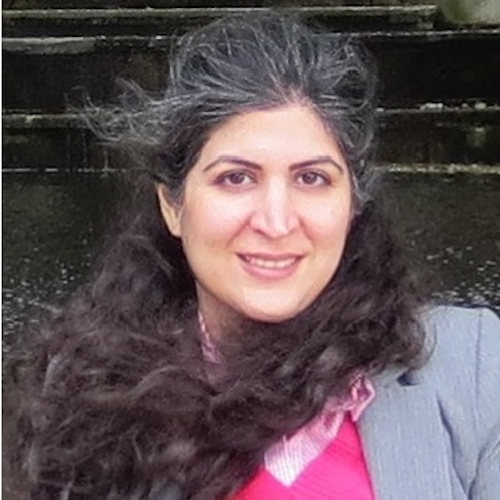“There is much beauty in the superficial complexity of nature. But there is a deeper beauty in the simplicity of [the] underlying process that accounts for the external complexity.” – Simon and Newell (1970)
This quote beautifully captures what I found so fascinating, comments RADMA scholar Sara Hajnassiri, who studied ‘Search strategies in holistic design problems’ for her PhD thesis. “Underlying all the complexity there are often simple, elegant principles that unify our understanding.”
We asked Sara about her research and the support that she had gained from RADMA.

Solving complex holistic design problems
Holistic design involves many interconnected elements, making it challenging to solve with traditional methods.
So my research focused on understanding the “search” process that designers use in solving complex, design problems. Specifically, I looked at how this process unfolds in three different industries: graphic design, small household appliances, and automotive design.
Key findings
My research revealed how designers often use trial-and-error and a blend of strategies, depending on the complexity of the design, to search for a solution.
I developed a number of frameworks to capture this and the work highlights how complexity in highly interconnected designs can be managed through strategies like trial-and-error and focused team coordination.
Additionally, the study introduced the concept of a “problem freeze” stage, where design exploration is intentionally limited to enable progress toward production. This is a practical approach for handling high-complexity projects.
Overall, these contributions provide valuable tools and perspectives for addressing intricate design challenges across various fields.
Learning from nature
One of the most interesting things I learned in research was the profound impact of interdisciplinary approaches and the idea that a common underlying principle can connect diverse fields of science.
In my work, I used the Kauffman NK model—a model that originated in evolutionary biology and has since been applied across fields. This helped me appreciate how scientific frameworks can reveal patterns across seemingly unrelated disciplines.
Coming from an academic background in physics and operations management, and a diverse professional background, I was new to the field of engineering design. Throughout my PhD studies, I learned not only about the intricacies of the design process, but also about the unique value that interdisciplinary research brings.
When insights from one area are applied to another, they can unlock fresh perspectives and drive innovation.
This experience affirmed the importance of fostering cross-disciplinary dialogue to bridge knowledge and foster new ideas.
What are you doing now?
Currently, I work as a Quality Assurance and Compliance Manager at the University of Cambridge, where I ensure that research activities meet regulatory and funding requirements.
In my work, I draw on R&D principles to navigate complex compliance landscapes, enhancing operational processes to meet high standards. This experience has reinforced my understanding of the critical role compliance plays in safeguarding research outcomes, allowing R&D initiatives to progress within clear ethical and legal boundaries.
What support did you get from RADMA and how did it help you?
The RADMA Scholarship provided essential financial support that enabled me to pursue my PhD at the University of Cambridge. Specifically, it covered my international tuition fees, which made it financially possible for me to pursue my research. They also funded my attendance at international conferences, where I had the chance to present my work, connect with other researchers, and gather fresh ideas and feedback. This experience really enriched my research and helped me grow professionally by allowing me to share my findings and learn from others in my field.
What do you think RADMA offers the research community?
R&D management is essential not only for developing new products and technologies but also for ensuring that these innovations are implemented effectively and sustainably. RADMA stands out as a funding organisation by offering tailored support specifically for research in this field, empowering scholars to push the boundaries of knowledge in R&D management.
While RADMA is a small charity and can only fund a few scholars each year, its support is both inclusive and impactful. The application process is straightforward, and there are no nationality restrictions, which makes it accessible to researchers from diverse backgrounds. This inclusivity allows RADMA to bring together a range of perspectives, fostering a collaborative and innovative environment that strengthens R&D management research across borders.
Sara’s research
- Search Strategies in Holistic Design Problems (2023) – PhD thesis, University of Cambridge, Cambridge, UK
- Hajnassiri, S. (2014). “Search Strategies in Holistic Design Problems.” 21st International Product Development Management Conference, Limerick, Ireland
- Hajnassiri, S. (2013). “Measuring Design Performance: Barriers and Challenges.” R&D Management Conference, Manchester, UK
- Hajnassiri, S. (2013). “On the Evolution of Software Process Models – Investigating the Drivers and Enablers of Process Innovation.” IPDMC, Paris, France

